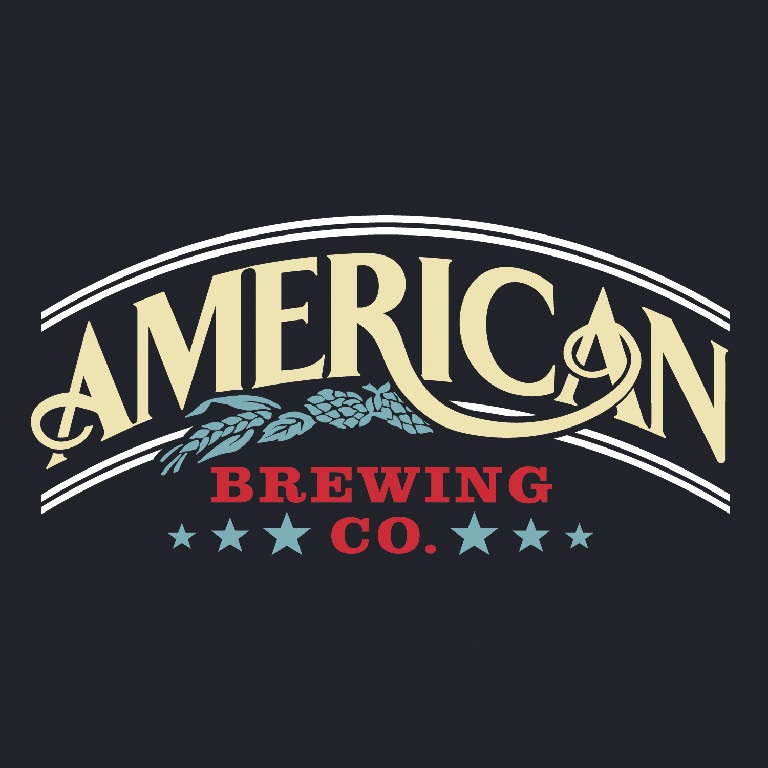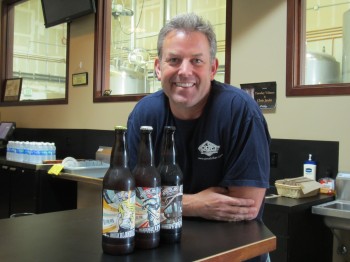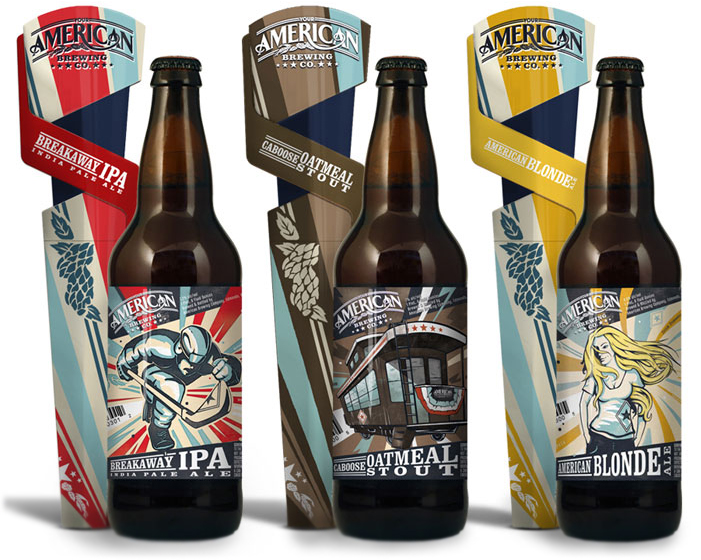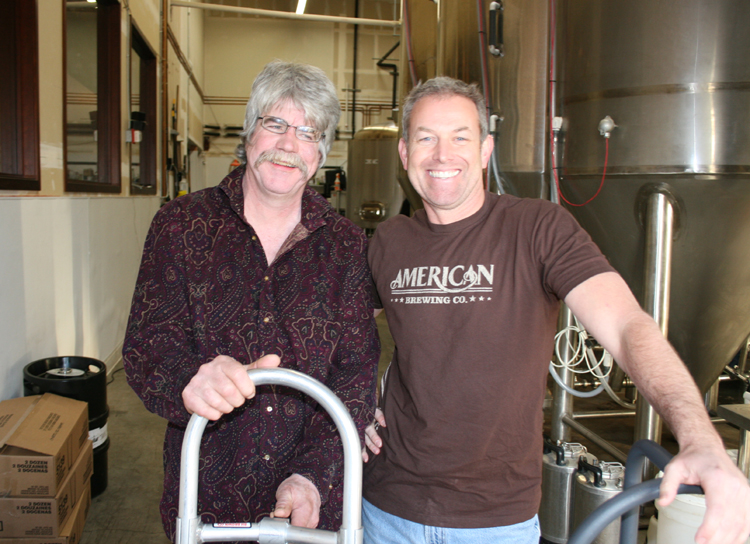 Washington State’s American Brewing Company went public last week – a surprise move of no small consequence that sent ripples throughout the Pacific Northwest’s craft beer community. In an additional act of recklessness, American Brewing’s CEO Neil Fallon agreed to sit down with us at ACB and give us the “inside-skinny” on what led up to his decision and what this all means to his company going forward.
Washington State’s American Brewing Company went public last week – a surprise move of no small consequence that sent ripples throughout the Pacific Northwest’s craft beer community. In an additional act of recklessness, American Brewing’s CEO Neil Fallon agreed to sit down with us at ACB and give us the “inside-skinny” on what led up to his decision and what this all means to his company going forward.
We have to ask the “900-pound-gorilla-in-the-room” question first. Why did you decide to take American Brewing public?
Easy – access to capital. The main problem facing small breweries today is their ability to raise capital for growth. The market is expanding at an exponential rate. Small, underfunded breweries are finding it difficult to keep up.
 When I first began doing my research and case studies prior to opening the American Brewing Company, I saw an amazing pattern that led to an incredible opportunity.
When I first began doing my research and case studies prior to opening the American Brewing Company, I saw an amazing pattern that led to an incredible opportunity.
The craft beer industry had been around for about 30 years. It had gone through a couple of cycles of building up and thinning out. But each time that cycle came and went, the total craft beer market expanded. From 2009 to today, the percentage of growth in craft beer has been in the double digits each and every year.
With that knowledge, I discovered that craft beer represented 5.2% of the overall beer market in 2009, and that according to the BA in 2013, it was 7.8%. Couple that with the fact that cities like Seattle, Portland, and Denver have about 25% market share and the trend in major cities across the US is heading in that same direction was enough to get my heart racing.
All I needed to do was hire the best beer professionals available, brew great beer using great practices, and find a way to get to the front of the pack to hopefully take advantage of the expansion that appears to be coming. All it takes is money and one of the best ways to access it is to share your vision and rewards with the public. Going public was a no-brainer. We are proud to be one of only five publicly traded craft breweries!
You’re now trading on the Over-The-Counter Bulletin Board (OTCBB) under the symbol ABRW and we know nothing about this kind of thing. Why did you choose to list your stock there and who decided the stock’s initial offering price?
Well a couple of reasons really. First, being a small-cap company right now, the requirements are relaxed a bit on the OTCBB. Even though we are required to be fully reporting and file quarterly and annual reports, we are not required to have as many board meetings (for example). And secondly, there is no annual fee to be listed on the OTC. The fees jump substantially when you uplist to the Nasdaq or NYSE.
The Sarbanes-Oxley Act was relaxed a couple of years ago, making it easier for small-cap companies to go public. Shortly after that, I was approached by an investor relations firm by the name of Nuwa (out of Walnut Creek, CA). They had been searching for a craft brewery to take public. They happened to be in my area and were referred by another individual that I had done business with in the past. We met at my brewery; we all really connected and decided to move forward. That was the series of events that led to my decision and the timing of it.
As for the pricing of the stock, it is a long series of events. First, we set a valuation of the company for a private offering (money raised through selling stock in the company). We based this valuation on our financials and we were successful in raising that money. That was the basis for our suggestion for an opening price that had to be approved by FINRA (the regulatory agency which, along with the SEC, must approve you before you can trade). Then ultimately, no matter what price you ‘come out’ at, the market decides your stock price based on what a seller is willing to sell for and a buyer is willing to buy for.
 American is an award-winning brewery with legions of fans that you are beholden to. As a publicly traded company, you will also now have to answer to your shareholders. Do you worry that this might somehow affect the brewery’s creativity? Might you guys find yourselves taking fewer chances in the future? Won’t it just be safer to play it safer?
American is an award-winning brewery with legions of fans that you are beholden to. As a publicly traded company, you will also now have to answer to your shareholders. Do you worry that this might somehow affect the brewery’s creativity? Might you guys find yourselves taking fewer chances in the future? Won’t it just be safer to play it safer?
Great question! And on the outside, it would seem logical, but no, not at all.
There are multiple levels of safety protecting me from the influence of shareholders. Number one, being that I am by far the largest shareholder in the company; I cast the most votes of any single person or entity on decisions. I am currently the President, CEO, and Chairman of the Board.
Second, there is a second class of stock called preferred stock. This stock is not traded and held only by me and my Vice President, Julie Anderson. This stock carries “Super Voting Rights.” So each share of preferred stock votes 500 votes per share. Common stock votes only 1 vote per share and common stock is what is publicly traded on the exchange. So without going through all of the math, even if we sold every share of common stock that I and the company own, my preferred shares would still outvote all common stock by about 2:1.
This company is my vision and it is enjoying success by following my planning and the world-class brewing of Skip Madsen and Marty Wilhelm. It will continue to do so for the foreseeable future. I will not play it safe. If we are to do extraordinary things, we must be a group of extraordinary men and women. That is our mantra.
The American craft beer industry is beloved for its entrepreneurial spirit and its independence. And sometimes, going public is confused with becoming more corporate. Some breweries, such as Samuel Adams, have successfully transitioned to publicly held companies without losing all their craft beer “cred” – others have not fared as well. Do you worry that American Brewing might be seen in a different light now that you’ve taken your company public?
I have to be honest–that is a fear that plays into the back of my mind. I cannot control the perceptions or beliefs of other people. I can only try and share what the future looks like in my head.
This is what I believe. We are a community of people living on the planet Earth. At the risk of sounding a little ‘woo woo’, it’s almost as if we are each a small part of a bigger organism. None of us can really accomplish a big goal without the help and support of others. We are, in a sense, part of a connected cycle. Or as Bono says…One! We need one another.
When I speak of acquisition or merger, I have no intention of creating a corporate chain where the bland sameness sterilizes anything that may be creative. Rather, I believe in creating a place where other breweries can come and flourish while maintaining their own identity. In essence, we’d be bringing together different families of beers – each with its own personality, local ingredients, and influence of its own creator. We celebrate the uniqueness and innovation of beers, not the boredom and repetition of corporate culture.
If I can create a vehicle where other breweries can merge and share their beers, techniques, and ideas, then we can “cross-pollinate” our beers into their markets and introduce their beers into our markets and both become stronger in the process. And how do we afford to do this? With the financing power the stock price brings.
 Your Head Brewer, Skip Madsen, is kind of a legend in the Pacific Northwest. He’s known for his mad brewing skills as well as for marching to his own drum…What did he think about your decision?
Your Head Brewer, Skip Madsen, is kind of a legend in the Pacific Northwest. He’s known for his mad brewing skills as well as for marching to his own drum…What did he think about your decision?
He thinks it’s good. He told me he’s not worried about it limiting his creativity. He feels that he will have the ability to open up many more styles because the company will grow (Cider? Oops… did I let that slip? I have to admit, no place grows apples or pears like Washington!). Also if we are successful in consolidating this fragmented market through merger or acquisition, it may give him the opportunity to brew alongside other “Great Brewer’s” of today? Can you imagine a beer that is brewed by Skip Madsen alongside some of the other great brewers of our time? Spectacular!
The craft beer industry is becoming a serious economic force in this country and it’s evolving. Do you think we will see more breweries choosing to go public in the near future?
I have no crystal ball, but if I were a betting man, I’d put money on a lot of companies watching to see how the public reacts to our decision. Let’s be honest, if executed properly, the value of your company will grow faster and with less debt in a public market than to remain privately held. After all, as selfless as brewing may seem, you still have to put food on the table. If successful, you might see a flood of publicly traded breweries.
 American Craft Beer The Best Craft Beer, Breweries, Bars, Brewpubs, Beer Stores, And Restaurants Serving Serious Beer.
American Craft Beer The Best Craft Beer, Breweries, Bars, Brewpubs, Beer Stores, And Restaurants Serving Serious Beer.
